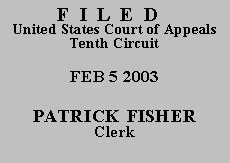

| UNITED STATES OF AMERICA,
Plaintiff - Appellee, v. JESUS GUERRERO-LOPEZ, Defendant - Appellant. |
2:01-CR-335-C |
Defendant Jesus Guerrero-Lopez seeks a certificate of appealability (COA) to challenge the district court's denial of his motion to correct sentence pursuant to 28 U.S.C. § 2255. Because he has failed to make a "substantial showing of the denial of a constitutional right," as required by U.S.C. § 2253(c)(2), we deny his request for a COA and dismiss the appeal.
Defendant pled guilty to illegal re-entry of a deported alien pursuant to 8 U.S.C. § 1326. Based on a total offense level of 21 and a criminal history category of VI, the guideline range of imprisonment for defendant was 77 to 96 months. The district court sentenced him to 96 months. Defendant did not file a direct appeal. He filed his pro se motion to correct sentence, stating he "was never informed of the specifics [by] his previous court appointed counsel . . . prior to his pleading guilty," Motion at 1, and specifically asserting the district court incorrectly sentenced him in comparison to similarly-situated prisoners. Defendant also requested appointment of counsel. The district court denied defendant's request for appointment of counsel, found that defendant's sentence was within the guideline range, and denied relief.
In his application for a COA, defendant claims his counsel was ineffective for failing to translate the presentence report or provide a copy of the report to defendant in Spanish. He also claims his guilty plea was unlawful because counsel only briefly explained the nature of the plea, did not provide a copy of the plea agreement in Spanish, and led him to believe the government would recommend the low end of the guideline range and that his state and federal sentences would run concurrently. These issues are raised for the first time on appeal and will not be considered. In re Walker, 959 F.2d 894, 896 (10th Cir. 1992) (stating "a federal appellate court does not consider an issue not passed upon below").(1)
If we liberally construe defendant's assertion that counsel failed to adequately inform him of the sentence ramifications of his plea as a claim of ineffective assistance of counsel, this claim fails. To show ineffective assistance of counsel, defendant must show, among other things, prejudice flowing from deficient representation, that is, that "there is a reasonable possibility that, but for counsel's professional error, the result of the proceeding would have been different." Strickland v. Washington, 466 U.S. 668, 694 (1984). The district court determined that defendant failed to show a disparate sentence. When we apply the Strickland criteria in assessing the merits of the claim raised in conjunction with any ineffective assistance of counsel claim, we cannot conclude defendant was prejudiced as regards any explanation counsel could provide defendant concerning disparate sentence.
The request for a COA is DENIED and the appeal is DISMISSED. The mandate shall issue forthwith.
Entered for the Court
Mary Beck Briscoe
Circuit Judge
*.This order and judgment is not binding precedent, except under the doctrines of law of the case, res judicata, and collateral estoppel. The court generally disfavors the citation of orders and judgments; nevertheless, an order and judgment may be cited under the terms and conditions of 10th Cir. R. 36.3.
1. Defendant attaches a § 2255 form motion to his application for a COA. This motion is dated August 12, 2002. However, this is not the motion that was filed in and considered by the district court.